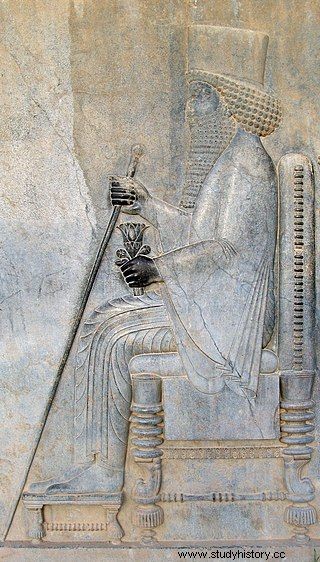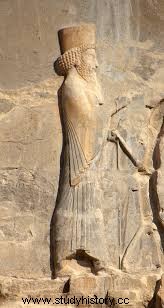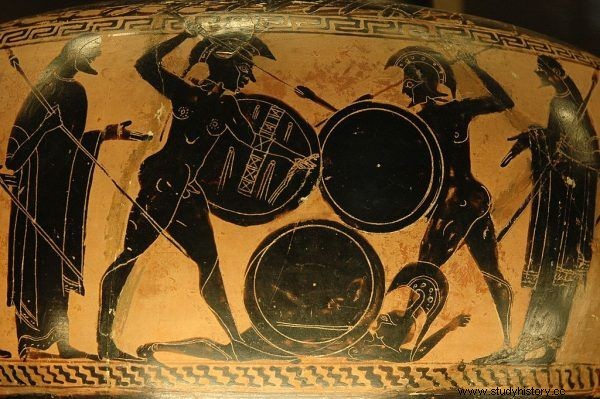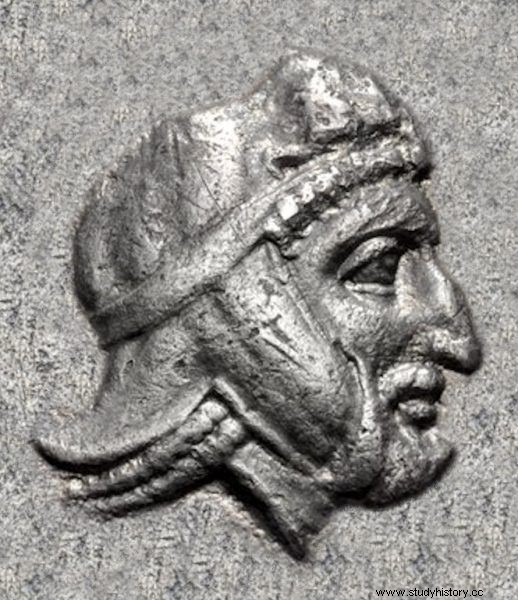Travel educates? And how! It turns out that snow can blind you, that not all honey has the same health and sweetness, and that there are irreplaceable people - some Greeks, hungry for fame, learned all of this.
Asia has always tempted people. The vast expanses and legendary riches kept many adventurers and rulers of ancient Europe sleepless. Jason of Fer, ruler of Thessaly, was sighing to the treasures of Asian kings. Philip of Macedon also dreamed of the splendors of the East. Only his son Alexander managed to fulfill these desires. Perhaps, however, until the victory over the Persians at Gaugamela in 331 BCE. it would not have happened at all had it not been for the insane return of the Greek mercenaries to the gates of Babylon 70 years earlier. The sons of Hellas entered their homelands rich not so much in spoils as in immortal fame. And even Alexander of Macedon's biographer Arrian envied them.
Their very appearance in the vast expanses of Mesopotamia was no mean feat, though to some degree inherent in the risk of their profession - mercenary soldiers. Completed in 404 B.C.E. The Peloponnesian War, in addition to weakening Athens in favor of the hegemony of Sparta, left huge crowds of unemployed warriors.
Many of them could not return to their homes and only in the struggle abroad did they see a chance to secure their future. And there was an opportunity for it - Cyrus the Younger, a Persian pretender to the Achaemenid throne, appeared with a job offer. This rebellious and ambitious son of who died in 404 BCE King Darius II of Persia was very much hoped for an inheritance from his father.
Fratricidal war
He hoped for the support of his mother Parysatis, who favored him among her children. But what his surprise must have been when Arsakes's elder brother was announced as Shah. Moreover, during the coronation, the new ruler, who took the name Artaxerxes in honor of his famous grandfather, accused him of conspiracy against himself and sentenced him to death. Ultimately, his mother's intercession saved him from being executed. Humiliated, dreaming of revenge, he returned to the provinces of Anatolia he had managed.

Dariusz II
There, using his political and organizational talent, he proceeded to the careful preparations of an armed expedition against his brother. And the situation was exceptionally favorable to him. Persia needed a strong and determined ruler, and Artaxerxes II was not. The state was losing influence in Egypt, and one of the greatest Iranian peoples of the Caspian Sea - the Kaduzia - declared its independence from the Achaemenids.
In this situation, many dignitaries saw Cyrus as the only salvation for the state. He himself, feeling this support, first of all needed a strong army. It was mainly made up of troops composed of Persians and non-Hellenic peoples of Asia Minor. However, he most counted on the battle-hardened and heavily armed troops of the Greeks. He then used his contacts with the Hellenes so far, because already in the last years of the Peloponnesian War he actively supported - especially financially - the Spartans against Athens.
Hellenes on Cyrus side
The veterans were just waiting for Cyrus to be called. However, it was not only the brave Spartans who had drawn to the assembly point in Sardis. The ranks of the hundred thousandth army of the pretender to the throne were also joined by:Athenians, Boeots, perfect archers from Crete, fearsome Thracians and lead-bullet-throwing slingers from Rhodes.
The Spartan exile Klearch was appointed the commander of the approximately 13-thousand-strong contingent of Hellenes. Perhaps only to him and a few lesser leaders did Cyrus reveal the true purpose of the expedition, fearing that the Greeks would not agree to an expedition to distant Babylonia. Officially, they were to support the Cyrus forces in the fight against the rebellious mountain people of Pisidia. When they bypassed their country, however, the real goal ceased to be a secret.
However, this did not discourage most of the Hellenes, who entrusted their fate to the lucky star of the young Achaemenid. Confident in his strength, he easily reached the center of the country. The rapid progress of the march only seemed to confirm the opinion of Artaxerxes II as a weak ruler and a poor strategist. Shahinshah did not man both the passes connecting Cappadocia with Cilicia, and the latter with Syria. Thus, there were many indications that the murderous march of Cyrus' army (27-40 km a day!) Would end in a great triumph over the king of kings.

Artaxerxes II Mnemon
In early September 401 B.C.E. Cyrus' forces found themselves in the fertile fields of Mesopotamia. There was only one step to Babylon. Artaxerxes had to do something at last if he wanted to hold the throne. His lack of reaction led to the disintegration of the ranks of the pretender's troops. Until now, the watchful Greeks even allowed themselves to take off their heavy gear. Finally, on the morning of September 3, an enormous army of Artaxerxes II appeared near the undefined settlement of Kunaksa (50-100 km west of Babylon).
The witness of these events - Xenophon - gave a fantastic number of armed shahinshah:1.2 million and 200 chariots. Such an estimate can be safely put between fairy tales, but the strength of the king of kings was far superior to that of Cyrus. However, he believed in his arguments and, above all, in invincible hoplites, on whom he spent almost all the profits from his satrapy . And on this point he was not disappointed.
The Decisive Battle
From the beginning of the battle, the Greeks, undaunted by the power of the malevolent enemy ranks, attacked many times, but each time the Persians surrendered the rear at the mere sight of them and the noise of shouts. Those who failed to escape shared the fate of their ancestors from Marathon. The Greeks themselves would only lose one warrior. So it seemed that the battle would be settled in favor of the younger Achaemenid.
However, where there were no Greek mercenaries, the situation did not look optimistic. Impatient and hungry for fame, Cyrus at one point collapsed with his 600-horsepower into the very center of Artaxerxes' troops. He even managed to break the king's 6,000 guard, forcing them to flee. However, during the chase, Cyrus' unit dispersed, and when he saw his brother, only a few of his relatives remained with him, the so-called accompanies the table. Undeterred by this, with a cry - I see this man! He rushed to attack and seriously wounded the king. At the same time, however, he was fatally hit by a bullet (sic!) Under the eye. Cyrus turned out to be an irreplaceable man, and his death had tragic consequences. The army without a leader fled and eventually surrendered to the royal forces.

Cyrus believed in the power of hoplites
Meanwhile, the successful Greeks in their episode hoped the same was happening where Cyrus was fighting. They didn't find out about his death until the next day. There was no point in further fighting, and attempts to come to an agreement with the Persians failed. Oil was added to the fire by the treacherous murder of most of the Hellenic strategists and officers during negotiations with the royal commander Tissafernes. Left to their fate in a hostile country, the Greeks had to reorganize themselves. In the course of stormy debates, new commanders were elected, including the author of the chronicle of these events, Xenophon, and set off for Hellas.
March of ten thousand
The retreat of the brave mercenaries, known as the 10,000 march (there were a bit more of them, but according to the Persian measure, the troops were 1 myriad, or just 10,000), initially took place under constant harassment by the Persian army. Tissafernes' army, before "escorted" the Greeks to the border of Mesopotamia, managed to suffer considerable losses, and after one of the skirmishes, the Hellenes left the terrible massacred bodies of 80 Persian prisoners as a warning to further persecutors . The further march led through the mountainous seats of the warlike Karduchs.
The struggle with them was best summed up by Xenophon himself, who wrote that they constantly fought (the Greeks) and suffered so much evil, much more than the king and Tysafernes put together .
The next Armenia on the way did not turn out to be more hospitable. The ruling Persian satrap Tiribazos did allow the Greeks to provide food supplies, but in fact he planned not to let the mercenaries out of their borders. In the end, Xenophon's soldiers managed to escape from the trap and enter the land of the Khalibas (known to cut off the heads of their enemies and wore them on the march), the Fazjan and the Taoch (they committed mass suicide after lost battles) - mountain tribes that did not recognize the rule of the Shahinshah.

Tiribazos
And here the days were spent in constant struggle to cross every mountain pass. However, those who saw the problems of human nature as the only difficulties in the march would be wrong. The highlands of Armenia welcomed mercenaries accustomed to the warm climates of Hellenic climates with harsh and snowy winters. Many of them were blind from the sparkling snow or, at best, frostbitten their toes. In the rush of troubles that the Greek hosts still faced, it seems like a skirmish with the Colchian tribe or a mysterious honey poisoning from apiaries encountered along the way. Fortunately no one died because of it, but for a few days there were so many Greeks, after some defeat, and there was great depression because of it .
Finally, in February 400 BCE, after 5 months of murderous wandering, at the cost of losing about 2,000 comrades, the mercenaries reported to Trapezunta, a Greek colony on the Black Sea. From there, in comfortable conditions, on board ships, they reached Greek cities around Byzantium. Not everyone was satisfied with the fame of mythical heroes. Almost 3,000 corps enlisted in the service of the Spartan king Agesilaus II, who in Asia Minor began a war with their recent opponent - Tissafernes. Former enemies are in the fight again, but that's another story.
